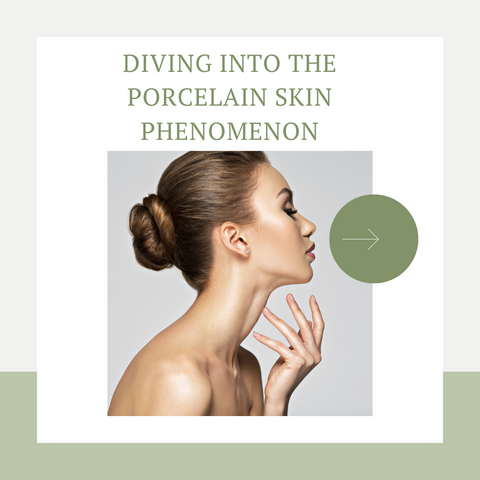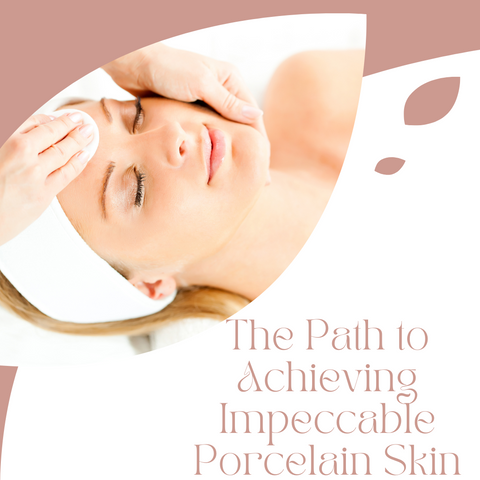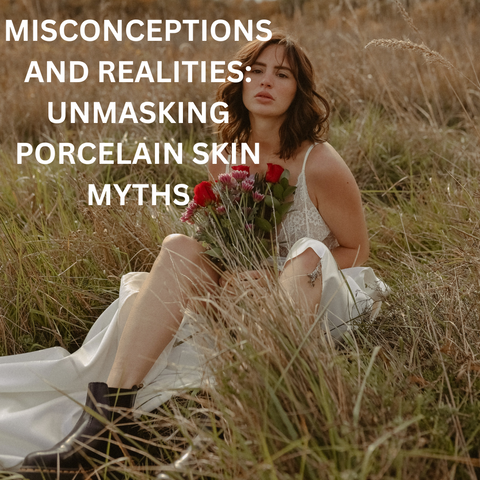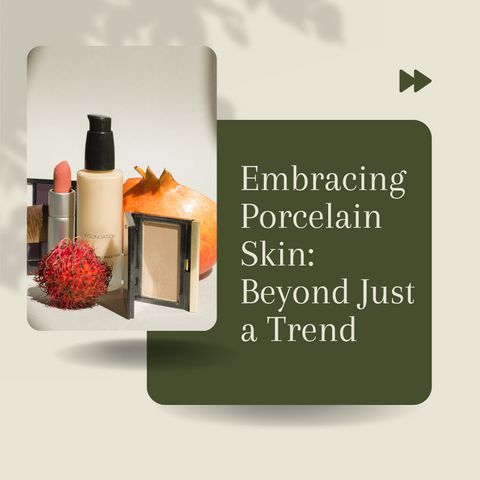The pursuit of flawless skin has long been a feature of human beauty standards, and porcelain-like perfection is frequently regarded as the pinnacle of skin beauty. This concept evolved over time, influenced by cultural ideas, historical figures, and contemporary media. Porcelain skin is skin that is smooth, even-toned, luminous, and free of blemishes or defects. The word is derived from the smooth, perfect surface of porcelain ceramics. This blog will go over the use of porcelain in skincare.
Diving into the Porcelain Skin Phenomenon

The obsession with porcelain skin has deep cultural roots and has evolved into a phenomenon that influences beauty standards all across the world. This pursuit of flawless, porcelain-like skin has resulted in a wide range of practises and attitudes, including historical relevance, Asian influence, media and celebrity influence, technological breakthroughs, makeup trends, emotional and psychological impact, and shifting beauty standards. While pursuing healthy skin is encouraged, it is also critical to promote realistic beauty standards and respect the diversity of skin types and textures. A well-balanced strategy that emphasises skincare for overall health and confidence while also celebrating individuality is required.
Historical Roots: Porcelain Skin through the Ages
The desire for porcelain-like skin as a beauty ideal has profound historical origins that span nations and eras. Here's a look at how the concept of perfect skin evolved throughout history, including ancient civilizations, mediaeval Europe, China, East Asia, the Renaissance period, the Victorian era, and modern times. While the beauty ideal of flawless skin remains, cultural perceptions have increasingly moved to accommodate varying beauty standards, fostering acceptance of different skin tones, textures, and individual uniqueness.
Why Porcelain Skin is Synonymous with Beauty
The link between porcelain skin and beauty stems from historical, cultural, and social elements that have moulded beauty ideals in various countries. Several factors lead to porcelain skin being associated with beauty:
-
Historical Importance: Throughout history, various cultures associated porcelain-like skin with wealth, nobility, and social status. In many societies, having pale, flawless skin was a symbol of high social standing because it implied that a person did not engage in outdoor labor and was protected from sun exposure, which could darken the skin.
-
Cultural Influence: The concept of "mochi-hada" or "glass skin" emphasises the pursuit of flawless, translucent skin in several Asian cultures, particularly in China, Japan, and Korea. This cultural ideal has been deeply ingrained for centuries, with skincare routines and beauty practises centred on achieving luminous, poreless skin.
-
Purity and Youthfulness: Porcelain-like skin is frequently associated with purity, innocence, and youth. Smooth, flawless skin is associated with beauty because it is seen as a sign of good health, vitality, and youth.
-
Influence of the Media and Celebrities: Images of flawless skin displayed in the media by celebrities, models, and influencers reinforce the notion that perfect skin is the pinnacle of beauty. The portrayal of flawless skin in films, advertisements, and social media platforms creates an unrealistic standard that many people strive to meet.
-
Symbolism and Aesthetics: By comparing skin to porcelain ceramics, which are known for their smooth, flawless texture, an aesthetic ideal was created that resonated with beauty standards. The phrase "porcelain skin" conjures up images of perfection and purity.
-
Global Beauty Standards: The globalisation of beauty standards has resulted in the widespread acceptance of flawless skin as a universal ideal. The beauty industry's marketing and promotion of products promising flawless skin help to maintain this beauty standard.
It is important to note, however, that beauty is diverse, and perceptions of beauty differ across cultures and individuals. While porcelain-like skin is still idealised in many societies, a growing movement advocates for inclusivity and celebrates diverse skin tones, textures, and individual beauty. Embracing natural beauty and diversity while acknowledging and respecting different cultural beauty ideals is critical to promoting positive and inclusive beauty standards.
Modern Interpretations: How Porcelain Skin Fits Today's Aesthetics
In contemporary times, the concept of porcelain skin continues to hold significance in beauty aesthetics, albeit with some nuanced shifts and broader perspectives on beauty. Here's how the idea of porcelain skin fits into today's beauty landscape:
-
Skincare Emphasis: There's a heightened focus on skincare routines and products aimed at achieving healthy, radiant skin. The pursuit of flawless skin is often linked to practices that prioritize hydration, exfoliation, protection from sun damage, and addressing specific skin concerns rather than solely focusing on achieving a pale complexion.
-
Natural-Looking Makeup: While the desire for flawless skin persists, there's a shift towards more natural-looking makeup. Instead of heavy foundation and concealers to mask imperfections completely, makeup trends often aim for a lighter touch that enhances skin's natural radiance while allowing some imperfections to show through.
-
Diversity and Inclusivity: Beauty standards are evolving to embrace diversity, advocating for inclusivity of all skin tones, textures, and types. The recognition and celebration of diverse beauty, including the acceptance of freckles, birthmarks, and other unique features, are gaining prominence.
-
Holistic Wellness Approach: The pursuit of flawless skin is often seen as part of an overall approach to holistic wellness. People are increasingly recognizing the link between diet, lifestyle, mental health, and skincare, aiming to achieve healthy skin from the inside out.
-
Technology and Innovation: Technological advancements in skincare, such as laser treatments, advanced serums, and non-invasive procedures, offer more effective solutions for improving skin texture, addressing hyperpigmentation, and reducing the appearance of blemishes.
-
Empowerment and Self-Acceptance: There's a growing movement promoting self-acceptance and empowerment, encouraging individuals to embrace their unique features and natural skin characteristics. This movement challenges the rigid pursuit of perfection and celebrates authenticity.
-
Media Representation: There's an increasing demand for authentic representation in media, calling for less retouching and a more realistic portrayal of beauty. The movement towards inclusivity encourages the celebration of real, unfiltered beauty in advertising, fashion, and entertainment.
While the idea of porcelain skin persists, the contemporary interpretation reflects a more inclusive and multifaceted approach to beauty. There's a shift towards embracing individuality, promoting healthy skincare practices, and celebrating diverse beauty standards. The current beauty landscape acknowledges that beauty comes in various forms and encourages self-confidence, self-expression, and acceptance of one's unique features.
The Path to Achieving Impeccable Porcelain Skin

A combination of skincare practises, lifestyle decisions, and prospective expert treatments is required to achieve perfect, porcelain-like skin. Here's a step-by-step guide to achieving flawless porcelain skin, including sun protection, healthy lifestyle habits, targeted treatments, professional treatments, avoiding harmful practises, consulting with professionals, consistency and patience, and self-care and stress management. Accept your skin's individuality and recognise that perfection is subjective. Consult with a skincare professional to develop a skincare programme that is tailored to your skin type and treats your unique needs, all while highlighting your natural beauty.
Essential Skin Care Rituals for Radiance
In order to achieve radiant skin, you must incorporate essential skincare rituals into your daily routine. Here are some basic steps and practises for glowing skin:
-
Cleansing: To remove dirt, oil, and makeup without stripping the skin's natural oils, use a gentle cleanser appropriate for your skin type (dry, oily, or combination).
-
Exfoliation: Exfoliating on a regular basis (1-3 times per week, depending on skin sensitivity) aids in the removal of dead skin cells, revealing a brighter complexion. Choose a gentle exfoliant suited for your skin type to avoid irritation.
-
Hydration: To lock in moisture and fill the skin, use moisturising serums or hyaluronic acid-containing products. Hydration is essential for maintaining a youthful and vibrant appearance.
-
Moisturizing: To keep your skin moisturised and balanced, use a moisturiser that is appropriate for your skin type. Moisturisers aid in the retention of moisture and the maintenance of the skin's natural barrier.
-
Sun Protection: Apply sunscreen with SPF 30 or higher daily, even on cloudy days, to shield your skin from harmful UV rays and prevent premature aging, dark spots, and skin damage.
-
Antioxidants: Include antioxidants, such as vitamin C serums, in your daily regimen. These assist in fighting free radicals, reducing inflammation, and brightening the skin, encouraging brightness.
-
Healthy Diet and Hydration: Acids to hydrate your skin from within. Drink plenty of water every day to stay hydrated. Consume a healthy diet high in fruits, vegetables, and omega-3 fatty acids.
-
Adequate Sleep: Aim for 7-9 hours of quality sleep per night to give your skin time to heal and rejuvenate, resulting in a more luminous complexion.
-
Stress Management: Stress-relieving practises such as yoga, meditation, or deep breathing exercises should be practised. Stress can have an adverse effect on skin health and brightness.
-
Consistent Skincare Routine: Maintain a consistent skincare routine that is tailored to your skin type and issues. Avoid switching products frequently, as this can upset the skin's balance.
-
Facial Massage or Gua Sha: Incorporate facial massage or Gua Sha techniques into your routine to promote blood circulation, relax facial muscles, and improve skincare product absorption, enhancing brightness.
-
Professional Treatments: Consider professional treatments such as facials, chemical peels, or microdermabrasion on a regular basis to revitalise the skin and boost radiance.
Keep in mind that consistent effort and patience are required to achieve glowing skin. Pay attention to your skin's needs and adjust your skincare routine as necessary. Consult a dermatologist or skincare professional for customised advice and recommendations based on your specific skin concerns.
Choosing the Right Products: From Serums to Sunscreens
Choosing the appropriate skincare products, such as serums and sunscreens, is critical for maintaining healthy and bright skin. Here are some things to think about when selecting these crucial skincare items:
Serums:
-
Identify Your Skin Concerns: Determine your specific skin concerns, such as hydration, brightness, anti-aging, or addressing specific disorders such as acne or hyperpigmentation.
-
Ingredients to Look For: Vitamin C, Hyaluronic Acid, Retinoids (Vitamin A derivatives), and Niacinamide.
-
Consider Your Skin Type: Oily Skin, Dry Skin and Sensitive Skin.
-
Check Product Reviews and Recommendations: For advice on acceptable serums for your skin conditions, conduct research, read reviews from reputable sources, or consult with skincare professionals.
-
Patch Test: Perform a patch test on a small area of your skin before fully introducing a new serum into your routine to check for any unpleasant reactions or allergies.
Sunscreens:
-
Broad-Spectrum Protection: Look for a sunscreen that offers broad-spectrum protection against both UVA and UVB rays.
-
SPF Level: Choose a sunscreen with an SPF of 30 or higher for adequate sun protection.
-
Non-Comedogenic and Lightweight Formulas: If you have oily or acne-prone skin, look for non-comedogenic formulas. Lightweight, easily absorbed sunscreens are ideal for daily use.
-
Water-Resistant: If you plan to swim or engage in sweaty activities, look for a formula that is resistant to water.
-
Ingredients and Additional Benefits: Some sunscreens contain additional skincare benefits such as antioxidants, moisturisers, and anti-aging agents. Consider these if they align with your skincare goals.
-
Ease of Reapplication: Select a sunscreen that is suitable for your lifestyle, allowing for easy reapplication throughout the day, especially if you spend a lot of time outdoors.
-
Expiration Date: Check the expiration date to make sure the sunscreen is still effective. Sunscreen that has expired may no longer provide adequate protection.
-
Consistency and Preference: To encourage consistent use, find a sunscreen that you feel comfortable wearing every day.
To see how your skin reacts to new products, patch-test them first and gradually incorporate them into your routine. Consult a dermatologist or skincare specialist for individualised advice based on your skin type and concerns.
The Role of Diet and Lifestyle in Enhancing Skin's Glow
Diet and lifestyle choices are important in promoting healthy, bright skin. What you eat and how you care for your general health can have a significant impact on the appearance of your skin. Here are some dietary and lifestyle changes that might help your skin glow:
-
Stay Hydrated, Healthy Fats, Antioxidant-Rich Foods, Vitamins and Minerals, Omega-3 Fatty Acids, Limit Sugar and Processed Foods are all part of a healthy diet.
-
Quality sleep, stress management, regular exercise, skincare routine consistency, sun protection, avoiding smoking, and limiting alcohol consumption are all examples of healthy lifestyle choices.
Combining a nutrient-dense diet with good lifestyle practises improves skin health. Prioritising overall wellness through a balanced lifestyle, appropriate sleep, stress management, and regular skincare practises will substantially improve the natural radiance and glow of your skin.
Misconceptions and Realities: Unmasking Porcelain Skin Myths

There are various myths and misconceptions around the concept of porcelain skin. Uncovering these fallacies will help you have a better knowledge of realistic skincare expectations:
-
Myth: Porcelain skin is only for people who are pale. Reality: The term "porcelain skin" is frequently associated with fair or pale skin. However, regardless of skin tone, the goal is to achieve a flawless, smooth complexion.
-
Myth: Perfect skin is flawless and free of flaws. Reality: No one has completely flawless skin. The majority of photos that show perfection are heavily filtered or edited. The actual skin has texture, pores, and the odd flaw.
-
Myth: It is possible to have porcelain skin overnight. Reality: Having radiant, healthy skin takes time and requires patience along with regular skincare routines and a healthy lifestyle. Rarely do quick fixes produce lasting effects.
-
Myth: Genetics alone determines porcelain skin. Reality: Skin health and appearance are greatly influenced by environmental factors, lifestyle choices, and appropriate skincare practises, although genetics does play a part in determining skin type and characteristics.
-
Myth: Expensive products or procedures are the only way to achieve porcelain skin. Reality: Expensive skincare products do not always have to be expensive. The use of consistent, high-quality products that are appropriate for your skin type can have a greater effect than price.
-
Myth: Porcelain skin is synonymous with dry skin. Reality: Even texture and smoothness, not just dryness, are important factors in porcelain skin. Dehydrated skin is not always a sign of healthy skin.
-
Myth: Skin made of porcelain does not wrinkle or age. Reality: Wrinkles are a normal aspect of ageing for everyone's skin. While it will not completely stop them, taking care of your skin can help slow down the signs of ageing.
Realities:
-
Individual Variation: Each person's skin type is distinct. A healthy self-image includes accepting one's unique skin characteristics and flaws.
-
Skincare is a Journey: Having healthy, glowing skin is a never-ending process. Consistency in skincare practises, lifestyle choices, and patience produces better results than chasing perfection.
-
Diversity in Beauty: There are many different kinds of beauty. Promoting inclusive beauty standards requires embracing a range of skin tones, textures, and features.
-
Prioritise Skin Health: Instead of focusing solely on appearance, prioritise skin health. Healthy skin is beautiful skin, regardless of whether it meets certain beauty standards.
-
Maintaining equilibrium: It is imperative to strike a balance between reasonable expectations and skincare endeavours. Striving for improvement without obsessing over unattainable perfection is better for one's mental health.
Understanding these myths and realities aids in the development of realistic skincare goals and the promotion of a positive perception of beauty that values diversity and individuality.
Debunking Myths Around Achieving the Perfect Complexion
Achieving the "perfect" complexion frequently necessitates overcoming various myths and fallacies. Let's dispel some common myths about the quest for flawless skin, such as perfect skin is purely genetic, expensive products guarantee perfect skin, natural products are always better for the skin, more products equal better results, exfoliating daily leads to clearer skin, and oily skin doesn't require moisturiser. On cloudy days or inside, sunscreen is unnecessary; acne-prone skin does not require hydration; skincare effects should be fast; and cosmetics can substitute skincare.
The Science Behind the Translucency and Radiance
Many elements pertaining to the physiology, biology, and general health of the skin have an impact on the translucency and radiance of the skin. Understanding the scientific basis behind these qualities can provide insight into achieving and maintaining radiant, translucent skin:
-
Skin Structure: The epidermis is the skin's outermost layer, responsible for transparency and light reflection. A moisturised, exfoliated skin appears smoother and reflects light more evenly, contributing to a radiant appearance. Melanocytes in the epidermis create melanin, which causes skin color and pigmentation. A more even distribution of melanin produces a more consistent skin tone and promotes translucency.
-
Hydration and Moisture: Skin that is well-hydrated appears plump, smooth, and reflects light more effectively, giving it a translucent appearance. Hydration aids in the maintenance of the skin's natural barrier, preventing dullness and enhancing brightness. Amino acids, hyaluronic acid, and ceramides, which are naturally present in the skin, help to retain moisture and contribute to a luminous complexion.
-
Collagen and Elasticity: Collagen, a structural protein, keeps skin tight and supple. Skin can lose its natural radiance and translucency when collagen production slows with age. This protein gives skin elasticity and suppleness. Elastin deficiency can impair the skin's ability to reflect light, reducing its brightness.
-
Cellular Turnover and Exfoliation: Skin cell turnover, the process by which old skin cells shed and new ones replace them, is essential for maintaining a youthful, glowing complexion. Slower turnover can result in a dreary, lifeless appearance. Exfoliation on a regular basis removes dead skin cells, promotes faster cellular turnover, and reveals brighter, smoother skin with increased translucency.
-
Sun Damage and Environmental Factors: Long-term sun exposure destroys collagen and elastin fibres, resulting in pigmentation abnormalities, fine wrinkles, and diminished skin brightness. Pollution, smoking, and other environmental stresses can all produce oxidative stress, which can contribute to skin dullness and reduce brightness.
-
Skincare Ingredients: It is a potent antioxidant that brightens the skin, lowers pigmentation, and increases collagen formation, hence increasing radiance. Its moisturising characteristics aid in the retention of moisture, plumping the skin and contributing to a more transparent appearance. These vitamin A derivatives promote new skin cell growth, which aids in skin cell turnover, texture improvement, and radiance.
Addressing Concerns: Sensitivity and Maintenance
To address skin sensitivity while maintaining its health and luminosity, a precise balance of gentle skincare practises, correct maintenance, and individualised regimens is required. Here's how to deal with sensitivity while also improving skin health:
-
Identify and Address Sensitivity: Determine the causes of skin sensitivity, such as specific substances, environmental variables (such as pollution or weather fluctuations), stress, or certain skincare products. Patch testing should be performed on a small area of skin before using new skincare products to check for unpleasant reactions or allergies. Choose fragrance-free, hypoallergenic, and non-irritating products designed for sensitive skin. Look for labels that say "suitable for sensitive skin."
-
Gentle Skincare Routine: Use a mild, soap-free cleanser that will not deplete the skin's natural oils. Avoid aggressive exfoliation, abrasive scrubbing, and alcohol-containing treatments. Hydrate the skin with a non-comedogenic, lightweight moisturiser designed for sensitive skin. To keep moisture in, look for compounds like ceramides or hyaluronic acid. Use a mild, broad-spectrum sunscreen made for sensitive skin to protect it from UV rays. Select physical sunscreens with zinc oxide or titanium dioxide.
-
Avoid Irritants: Fragrances can cause irritation to delicate skin. Choose goods that are fragrance-free or have been formulated without the use of perfumes. Avoid using skincare products that include harsh chemicals such as sulphates, parabens, or alcohol, as these might aggravate sensitivity.
-
Soothing and Calming Treatments: To relax and minimise redness, use skincare products with calming components like aloe vera, chamomile, oat extract, or green tea. To relieve inflamed skin, use a cool, moist cloth or a chilled gel mask.
-
Professional Guidance: Seek advice from a dermatologist or skincare professional who can prescribe products and treatments that are appropriate for your unique skin conditions. Professionals can improve overall skin health and reduce skin sensitivity with mild treatments like chemical peels or laser therapy.
-
Lifestyle Factors: Stress can make skin more sensitive. Stress-relieving activities such as yoga, meditation, or deep breathing exercises can be beneficial. Eat a well-balanced diet rich in antioxidants and omega-3 fatty acids to promote skin health.
You can manage skin sensitivity while maintaining its health and promoting radiance by following a gentle skincare routine, avoiding irritants, and seeking professional advice. As you work towards a routine that works best for your sensitive skin, consistency and patience are essential.
Embracing Porcelain Skin: Beyond Just a Trend

Embracing porcelain skin is more than just a passing fad; it is about celebrating individual beauty and recognising the importance of healthy skin. Here are some of the reasons why adopting porcelain skin goes beyond a trend: it promotes skin health, diversity and inclusivity, self-confidence and empowerment, the skin positivity movement, self-care and wellbeing, and belief in one's own attractiveness. It's all about fostering inclusivity and recognising the uniqueness of each beauty.
































